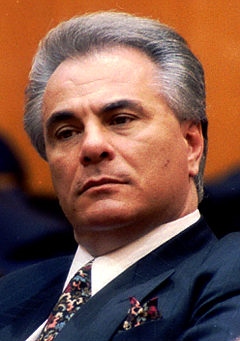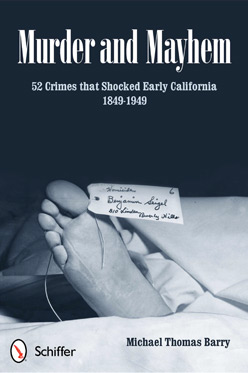10.26
This week (October 26 – November 1) in crime history – Betty Ferreri killed her abusive husband in Los Angeles (October 26, 1948); Mob boss John Gotti was born (October 27, 1940); Music legend Chuck Berry’s trial for violation of the Mann Act began (October 28, 1961); Crime novelist and journalist Dominic Dunne was born (October 29, 1925); Indira Gandhi, Prime Minister of India was assassinated (October 31, 1984); President Harry Truman escaped an assassination attempt (November 1, 1950)
Highlighted Crime Story of the Week –

On October 27, 1940, John Joseph Gotti, Jr., the future head of the Gambino crime family and a man later nicknamed “the Dapper Don” due to his polished appearance and expensive suits, was born in the Bronx, New York. Gotti, the grandson of Italian immigrants, was raised in a poor family with 13 children. Growing up, he did errands for mobsters in his East New York neighborhood, joined a gang called the Fulton-Rockaway Boys and quit school at age 16. He racked up a series of arrests for petty crimes, but escaped real jail time until 1968, when he pleaded guilty to hijacking trucks near New York’s Kennedy International Airport and received a three year sentence.
In 1974, Gotti was arrested for the revenge slaying of a man who had kidnapped and killed the nephew of crime family boss Carlo Gambino. He was sentenced to four years; however, as a result of bribes to prison officials, he was allowed out to visit his family and associates. After Gotti was officially released from prison in 1977, he was promoted to captain in the Bergin crew of the Gambino family, the nation’s biggest and most powerful organized crime group. In December 1985, Gotti grabbed control of the Gambino family after ordering the murder of then-boss Paul Castellano outside a Manhattan steak house.
In 1985, the federal government, which had been wiretapping Gotti and his associates, accumulated enough evidence to indict him on federal racketeering charges. The subsequent trial, in 1986, resulted in an acquittal for Gotti, who the media dubbed “the Teflon Don” for his ability to avoid conviction. The jury foreman in the case was later convicted of accepting a large bribe to vote for the mob boss’s acquittal.
As head of the Gambino family, Gotti’s swagger and colorful style made him a tabloid press favorite and he raked in millions of dollars from criminal activities, all the while claiming to be a hard-working plumbing salesman. Government wiretaps revealed that behind the showy public image, he was a ruthless figure who wouldn’t tolerate disrespect from anyone. In December 1990, Gotti and several associates were arrested on a variety of charges at the Ravenite Social Club in New York City’s Little Italy neighborhood. Mobster Salvatore “Sammy the Bull” Gravano eventually made a deal with the government to testify against his boss and in April 1992, a jury found Gotti guilty of 13 counts, including murder and racketeering. He was sent to the U.S. Penitentiary at Marion, Illinois, where he was locked in a cell 23 hours a day. On June 10, 2002, John Gotti died of throat cancer at age 61 at a medical center for federal prisoners in Springfield, Missouri.
Check back every Monday for a new installment of “This Week in Crime History.”
Michael Thomas Barry is a columnist for www.crimemagazine.com and is the author of seven nonfiction books that includes the award winning Murder and Mayhem 52 Crimes that Shocked Early California, 1849-1949 and In the Company of Evil Thirty Years of California Crime 1950-1980 (released in March 2016).











